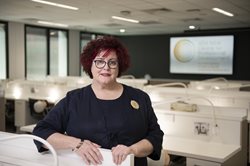16 December 2021
The Daily Advertiser (Wagga Wagga)
 A shortage in dental practitioners across the states regions could be the result of a lack of incentives according to Wagga-based Australian Dental Association (ADA) NSW Board member Dr Kathleen Matthews.
A shortage in dental practitioners across the states regions could be the result of a lack of incentives according to Wagga-based Australian Dental Association (ADA) NSW Board member Dr Kathleen Matthews.
"What we've noticed across the Murrumbidgee Local Health District is the inability to attract suitable applicants to our positions as dental practitioners," Dr Matthews said.
"The federal government announced they would look at paying the costs of HECS (a scheme that assists eligible Commonwealth supported students with their student loans) for nurses and doctors looking at coming to working in regional NSW.
"Those sorts of incentives to potentially take up graduate dental practitioner positions in regional and rural health centres would be good."
A submission into the NSW Parliamentary inquiry into rural and remote dentistry by the ADA NSW heard last week that as a result of shortages, regional and remote areas are also making up more than a third of those on dental waiting lists.
Statistics released by NSW Health revealed there are currently 350 adults on the public dental waiting list in the MLHD alone.
"What we see as a profession is gaps in access for communities that are regional, rural and remote compared to our city cousins," Dr Matthews said. "We can see there's an issue in access and equity access to dental care in our regional communities."
Statistics also show 30 per cent of the Wagga population avoid going to the dentist because of the cost. "That's because access to dentistry and access to dental care sits outside regular Medicare funding," Dr Matthews said.
"To be eligible for public dental care in Wagga, you either need to have a healthcare card or pension card or be a child under 18 living in the district
"If they don't have that spare income, aren't eligible for the above and have a problem with a tooth then that puts added pressure on the medical system.
"It is important to acknowledge the mouth sits outside the rest of the body, if you had an infected toenail then that might be more easily managed by the medical system than an infected tooth if you don't have the ability to find a way to access care."
Dr Matthews said there are around 400 "potentially preventable" hospitalisations for dental conditions in Wagga each year.
"That's significant," she said. "Often they're young children and they're needing multiple baby teeth removed due to early-childhood tooth decay.
"I would certainly see at least two children under the age of six on that list every month and I would end up taking out multiple teeth- that's concerning."
Dr Matthews said she also sees adults with advanced tooth decay, requiring all their teeth to be removed. "That may be preventable if access to dental care or access to preventive care like support had been easier," she said.
"I'd really like to think we could start at the preventable end and not start at the surgical end as much as we do."
Dr Matthews said country folk living "in the bush" face bigger barriers than those in cities when it comes to accessing dental care.
"If it's going to take two hours for you to go to the dentist, is that going to be a priority for you?" Dr Matthews said.
"Then there's funding- social economically we know our city cousins are richer than our country cousins, so there are bigger barriers in seeking self-funded care."